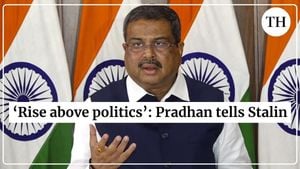Sudan, known for its rich resources and diverse culture, is bracing for significant economic changes as it approaches its 2025 budget planning. With recent developments, the Sudanese government is setting the stage to tackle its persistent fiscal challenges and project future economic growth through its upcoming budget.
The fundamental focus of Sudan's 2025 budget lies in managing inflation, which has been soaring due to various economic factors. Reports suggest the government aims to bring inflation rates back to more manageable levels, enabling the stabilization of prices for basic goods and services, which remain out of reach for many Sudanese citizens. According to local analysts, effective fiscal governance will be pivotal.
Who is at the helm of these economic reforms? Sudan's transitional government, under the leadership of Prime Minister Abdalla Hamdok, has been vocal about the need for substantial economic restructuring. Hamdok has emphasized comprehensive reforms to optimize public spending and increase revenue. "A focused approach on reforming tax systems and eliminating redundancies will be prioritized," noted Hamdok during recent official statements.
When is all this set to happen? The government is preparing to finalize the budget by the end of 2024 and aims to implement these strategies as early as January 2025. The urgency behind these plans is underscored by rising public discontent as citizens wrestle with dwindling purchasing power.
Where exactly does the government see the most pressing needs? There is significant emphasis on the agricultural sector, which is the backbone of Sudan's economy. The government intends to invest more heavily to boost agricultural output, hoping to not only feed the local population but also increase exports. Chief financial officers from major agricultural companies have started discussions with government officials to explore funding opportunities.
Why does the government prioritize these specific reforms? The underlying motivation is clear: to curb the economic stagnation caused by years of political upheaval and conflict. A more resilient economy is seen as necessary for gaining public trust and restoring international relations, especially following the lifting of sanctions and the promise of foreign investment.
How will the budgeting process address these issues? Through increased transparency and stakeholder engagement, the government plans town hall meetings. By involving local citizens and fostering dialogue, they seek to build public confidence and inclusiveness.
Despite these encouraging plans, challenges remain. Sudan's economy has long suffered from high inflation rates, shortages of basic goods, and the aftereffects of international sanctions. The government’s effort to solicit international aid has had mixed results, with many donors pledging support yet hesitating to commit fully due to the political instability.
Empowered by these conditions, Sudan hopes to see changes by 2025. Economists are cautiously optimistic. International financial institutions, including the World Bank and the International Monetary Fund (IMF), have expressed willingness to assist Sudan if it follows through on promised reforms and maintains political stability.
Engagement with the private sector is also on the rise. The expectation is to leverage domestic and foreign investments to stimulate growth. Investors have begun to take notice of Sudan's potential, particularly as it relates to mineral resources and agricultural land. An increasing number of business forums aim to connect entrepreneurs with potential partners.
While anticipation mounts, local families continue to feel the pinch of the current economic climate. The price of basic commodities has surged, sending many officials back to the drawing board to devise strategies for quick relief measures. "We face tough decisions, but we must think strategically for long-term growth," said one committee member.
Although the government expressed commitment to reforming the economy, public skepticism lingers. Many citizens voiced doubt over whether promises would translate effectively on the ground. A recent survey indicated significant public distrust, with many questioning the government’s capacity to manage fiscal matters effectively.
The 2025 budget will not just be about numbers; it’s about lives and futures. From urban youths seeking job opportunities to rural farmers hoping for governmental aid, many are watching closely to see if Sudan’s path forward can become one filled with opportunity rather than uncertainty. The sense of urgency is palpable, and as the clock ticks down to 2025, the commitment and execution of these plans will be under the microscope.
Expectations remain high as the budget outlines emerge, indicating not only what the country hopes to achieve but also reflecting the overarching aspirations of its citizens. If the government plays its cards right, it may steer Sudan toward stability and growth.



